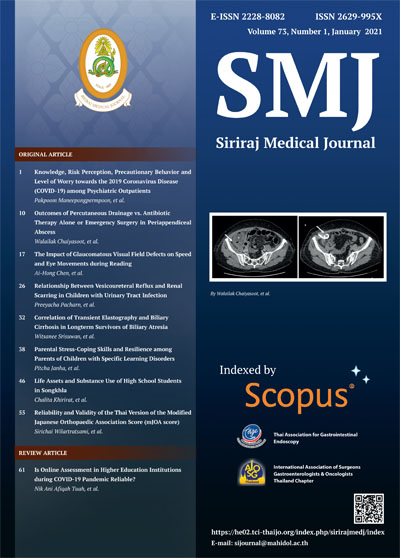Reliability and Validity of the Thai Version of the Modified Japanese Orthopaedic Association Score (mJOA score)
DOI:
https://doi.org/10.33192/Smj.2021.08Keywords:
Reliability, validity, Thai version, Modified Japanese Orthopaedic Association Score, Thai-mJOAAbstract
Objective: To evaluate the reliability and validity of the Thai version of the modified Japanese Orthopaedic Association scale.
Methods: The modified Japanese Orthopaedic Association scale was translated into Thai language to create the Thai version of the Modified Japanese Orthopaedic Association (Thai-mJOA) scale. Translation was performed according to international standards using a forward-backward translation protocol. Translation was performed by 2 expert translators and 1 physician, and the final version was approved by an expert committee. Thai patients with cervical spondylosis with myelopathy were enrolled and evaluated using the Thai-mJOA scale, Nurick Grading, the Thai version of the Neck Disability Index (Thai-NDI), and the Thai version of the Short Form-36 (Thai-SF-36). Reliability and validity of the Thai-mJOA were assessed via comparison with the Nurick Grading and the Thai-NDI.
Results: Ninety-two patients were included. The most common compression level was C5-C6 vertebral disc. Cronbach’s alpha of the total Thai-mJOA showed excellent internal consistency (0.991). The intraclass correlation coefficient (ICC) for test-retest reliability was 0.981 (95% confidence interval [CI]: 0.972-0.988). Regarding concurrent validity, the motor dysfunction score of the lower extremities and the total score of the Thai-mJOA were strongly correlated with Nurick Grading (r=0.825, r=0.712, respectively). The total score of the Thai-mJOA was moderately correlated with the Thai-NDI (r=0.670).
Conclusion: The Thai-mJOA was found to be a valid and reliable tool for evaluating symptom severity in Thai patients with cervical spondylosis with myelopathy.
Published
How to Cite
Issue
Section
License
Copyright (c) 2020 Siriraj Medical Journal

This work is licensed under a Creative Commons Attribution-NonCommercial-NoDerivatives 4.0 International License.
Authors who publish with this journal agree to the following conditions:
Copyright Transfer
In submitting a manuscript, the authors acknowledge that the work will become the copyrighted property of Siriraj Medical Journal upon publication.
License
Articles are licensed under a Creative Commons Attribution-NonCommercial-NoDerivatives 4.0 International License (CC BY-NC-ND 4.0). This license allows for the sharing of the work for non-commercial purposes with proper attribution to the authors and the journal. However, it does not permit modifications or the creation of derivative works.
Sharing and Access
Authors are encouraged to share their article on their personal or institutional websites and through other non-commercial platforms. Doing so can increase readership and citations.















